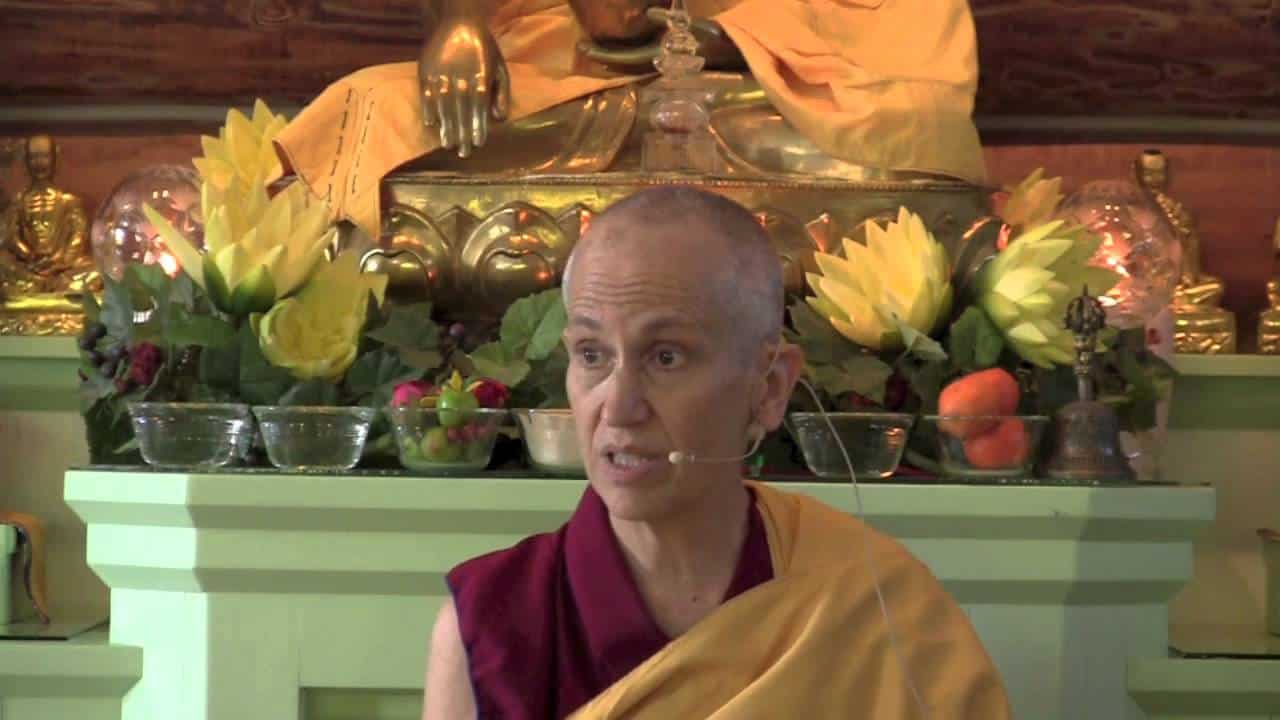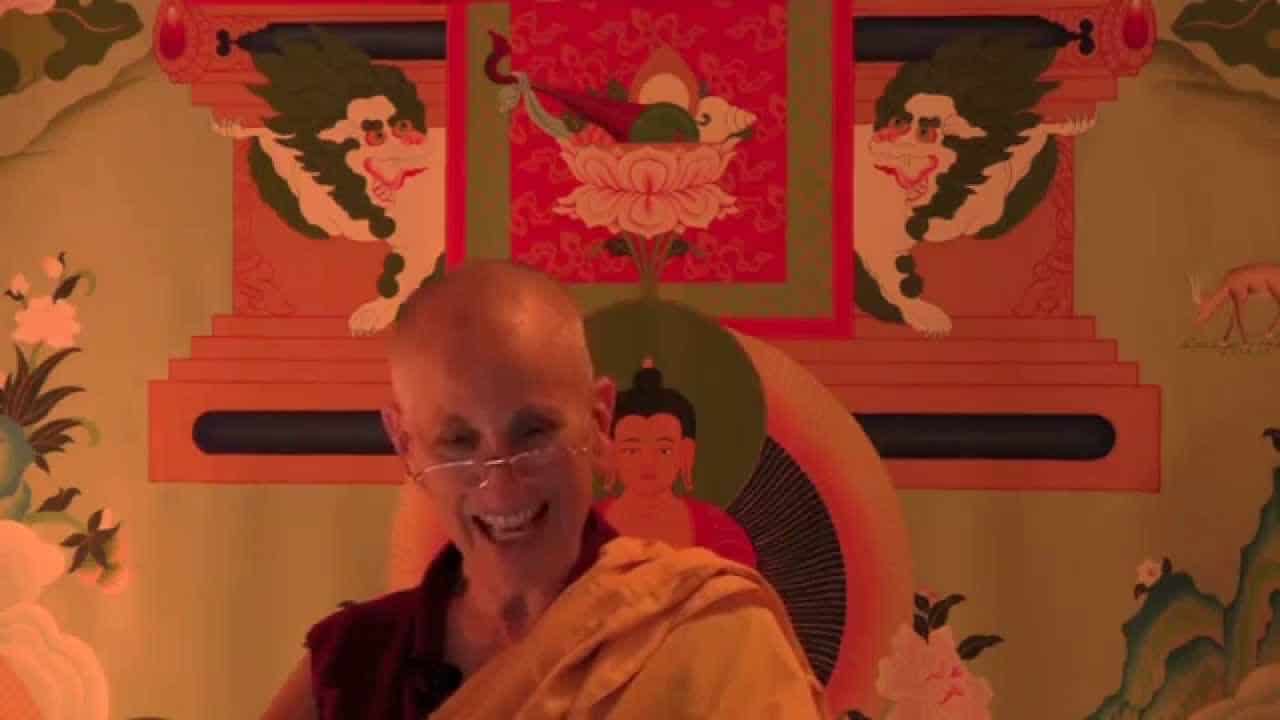Verse 62: The wish-fulfilling jewel
Part of a series of talks on Gems of Wisdom, a poem by the Seventh Dalai Lama.
- The importance of finding and establishing a good relationship with a qualified teacher
- A qualified Mahayana teacher guides us on the path, but we must also be qualified students
- Making up our own path may be beneficial in the short term, but it will not get us all the way to awakening
Gems of Wisdom: Verse 62 (download)
“What is the crown jewel that effortlessly fulfills all wishes?” [Bodhicitta would be a good answer, but it’s not the answer here.] “A supreme master of the Mahayana who guides one along the path to perfection.”
What is the crown jewel that effortlessly fulfills all wishes?
A supreme master of the Great Way who guides one along the path to perfection.
In other words, a Mahayana teacher.
We have to ask, “Well, why is a Mahayana teacher a crown jewel that effortlessly fulfills all wishes?” Why?
[Response to audience] Because without a teacher there are no other jewels to find. That’s exactly it. It’s due to the teacher that we’re introduced to the Dharma, that we learn the Dharma, we learn how to look at our own mind, we learn how to work with our own mind, we learn about bodhicitta and wisdom and so on. And without a teacher we’re kind of left to our own devices. And so somebody might have a very genuine spiritual yearning, but they don’t know what to do with it.
This may have been like us before we met the Dharma. You’re looking for something, but you don’t know where to go, what to do. And here it also specified—what did he say? A supreme master, a supreme Mahayana master.
I think “supreme” here is meaning a fully qualified Mahayana master. In other words, somebody who has all the qualities to be able to lead us from here to awakening. That’s really stressing the importance of having a qualified teacher, not just somebody who has the name “teacher.” Because now—in the West, anyway—anybody can make themselves into a teacher. But that doesn’t mean they really are one. And it doesn’t mean that they are a qualified one.
His Holiness often says that there are people who are nobody in Asia, and they come here and all of a sudden they have a string of titles attached to their name. So it’s quite important to really investigate a person and know their qualities and see if they’re capable of guiding you, and if they understand the Dharma well enough to do that.
Because it would be like if you’re going to go to flight school, you want somebody who knows how to fly an airplane to teach you. You don’t want somebody who’s been throwing paper airplanes, or somebody even who knows how to fix airplanes but doesn’t know how to fly one.
We really need to look for somebody who’s qualified. And then here it’s specifying a Mahayana master, because that will enable us to enter the bodhisattva vehicle straightaway; instead of progressing on the path to arhatship, liberating ourselves, and then later having to go back and start the bodhisattva path from the path of accumulation all over again.
The spiritual master is often called the root of the path. If you look at a plant, the root is not the whole plant. But the root is what grounds the plant. And the root is where the plant gets a lot of its nourishment. And so it is, too, when we have a qualified teacher and a good relationship with that teacher, then that can be very, very nourishing to us—not only in terms of learning the Dharma, but in terms of feeling inspired to practice, in terms of somebody pointing out to us the things that we need to work on, or somebody correcting our misunderstandings (of which we have more than too much). And then especially somebody in the Mahayana tradition who can really lead us on the bodhisattva path. Because without that we wind up making up our own path.
I was talking about that the other day. Remember Lama Yeshe used to call it “making soup,” you know, a little bit of this and a little bit of that. But it’s not necessarily a clear path. It may make us feel good, and may be helpful for a while, but it’s not going to take us all the way to full awakening.
We really want to find a teacher who teaches the path as taught by the Buddha himself. Not some “new age” somebody who made something up last Friday. And not somebody who doesn’t know the teachings well. Because what I’ve really noticed is, very often the first things we learn about Dharma are the things we remember the most. And so if we learn something that’s erroneous at the beginning it can really take us a long time to undo it. That thought keeps coming back.
It’s not just a question of finding a teacher, it’s a question also of establishing a good relationship with that teacher. And that’s up to the students to establish the relationship. The teacher isn’t going to go around and call all the students every week, “Hi, how are you doing? How’s your practice?” I mean, could you imagine somebody like His Holiness trying to do that with thousands of people? Or even somebody who doesn’t have thousands of students, it’s not up to the teacher to do that. It’s up to the students to contact the teacher and to create the relationship by going to where the teacher is and listening to teachings and offering service, and so on.
[In response to audience] Yes, “that effortlessly fulfills all wishes.” If you have a good relationship with a qualified teacher…. Of course, effort on the path is required. But what it’s meaning here is that it doesn’t have to be this strenuous kind of heavy thing. But when the student is receptive and the teacher has the ability, then things go very quickly and very smoothly. Yes. So that’s what the “effortlessly” means. It doesn’t mean that nobody has to exert any effort, and it all kind of happens by magic. No.
[In response to audience] That’s why the teacher may be very qualified, but if we aren’t a qualified student, and we’re full of our own ideas and we don’t want to listen to what teachers recommend, and they point things out to us and we get defensive, and everything that happens we blame somebody else…. Then you could have the Buddha here and we’re not going to progress on the path. It’s not just a question of finding the teacher, it’s making ourselves into receptive students, too.
Venerable Thubten Chodron
Venerable Chodron emphasizes the practical application of Buddha’s teachings in our daily lives and is especially skilled at explaining them in ways easily understood and practiced by Westerners. She is well known for her warm, humorous, and lucid teachings. She was ordained as a Buddhist nun in 1977 by Kyabje Ling Rinpoche in Dharamsala, India, and in 1986 she received bhikshuni (full) ordination in Taiwan. Read her full bio.


